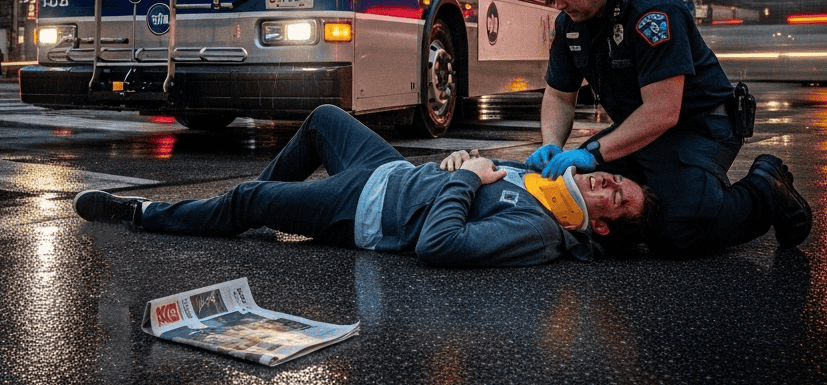Millions of people depend on public transportation every day. With approximately 953,787 rides daily, the Chicago Transit Authority stands as the second-largest public transportation system in the United States. Most days, everything runs smoothly. But when something goes wrong, the consequences can be devastating.
If you've been injured on public transportation, you're probably feeling overwhelmed. Medical bills are piling up, you're missing work, and the transit authority is already trying to minimize what happened. That's where we come in. At Collins Law, we fight for people just like you, and we know how to win these cases.
Public transportation accidents happen more often than most people realize. Every year, thousands of passengers suffer injuries on buses, trains, and other transit vehicles. These aren't just minor bumps and bruises. We're talking about serious, life-changing injuries that happen when transit operators fail to keep passengers safe.
When a 40,000-pound bus crashes, the results are catastrophic. People standing in the aisle have nothing to protect them. Even a sudden stop can send someone flying into a pole or another passenger.
These accidents are often caused by:
Train accidents might not happen as often as bus crashes, but when they do occur, the injuries tend to be even more severe. A derailing Metra train can throw passengers from their seats with tremendous force.
The types of rail accidents we handle include:

The injuries we see in public transportation cases are often more severe than typical car accident injuries. Why? Because passengers usually aren't wearing seatbelts. Many are standing when accidents happen. There's nothing to cushion the impact when a bus crashes or a train stops suddenly.
The most common injuries our clients suffer include:
Here's something most people don't know: suing a public transit agency is nothing like filing a claim after a regular car accident. The government has special protections in place that make these cases much more complicated.
Transit agencies also have the resources to hire teams of lawyers whose only job is fighting injury claims. If you don't follow their rules exactly, you could lose your right to compensation forever.
The law gives government agencies partial immunity from lawsuits. This means you can't simply file a lawsuit like you would against a private company. Instead, you must first file a formal notice of claim with the transit agency. This isn't just a letter saying you got hurt. It's a detailed legal document that must include specific information about your accident, injuries, and damages.
You often have just 6 months to file this notice. If you miss the deadline by even one day, you may be barred from filing a claim. No exceptions. The notice requirements are incredibly strict, and even small mistakes can destroy your claim. That's why having an experienced lawyer handle this process is so important.
Importantly, the Chicago Transit Authority (CTA) is specifically excluded from certain government immunities. This means you may have a clearer legal path to sue the CTA than other public agencies, but you still must follow strict notice rules. One wrong step could end your claim before it begins.
Most personal injury cases give you 2 years to file a lawsuit, but not public transportation cases. Some have 1-year deadlines. Others may be granted even less time. These shortened deadlines exist because the government wrote the rules to protect itself, not injured passengers.
While you're focused on recovering from your injuries, attending doctor appointments, and trying to get back to work, the clock is ticking on your legal rights. By the time many people realize they need a lawyer, it's already too late. Don't let this happen to you.
At Collins Law, we have secured over $904 million in settlements and verdicts for our clients. That kind of success doesn't happen by accident. It comes from thorough preparation, aggressive representation, and the resources to take on anyone, including government agencies with deep pockets.
The moment you hire us, we start building your case. Our investigation process leverages our firm's extensive resources to:
You've suffered enough. Between the physical pain and financial stress, a public transportation accident can derail your entire life. That's why we fight for every dollar you deserve, not just for your current bills, but for everything this accident has cost you.
Every case is unique, but public transportation accidents often result in substantial settlements or verdicts.
Types of compensation available include:
Insurance companies representing transit agencies have one goal: paying you as little as possible. Insurers may make quick settlement offers, hoping you don't know what your case is worth. They are likely to pressure you to accept pennies on the dollar before you even know the full extent of your injuries.
We don't let that happen. We know the tricks insurers use and how to counter them. If they won't offer fair compensation, we're ready to take your case to trial. Transit agencies know our reputation, and they know we mean business.
Public transportation accidents can change your life in an instant. The physical pain is bad enough. But the financial stress and uncertainty about your future can be just as overwhelming.
You don't have to face this alone. Collins Law has the experience, resources, and determination to take on the CTA, Metra, or any other transit authority.
We have secured over $904 million for our clients because we refuse to back down. We refuse to let insurance companies take advantage of injured people. And we refuse to accept anything less than full compensation for what you've been through.
Contact Collins Law today. Whether you were hurt on a CTA bus, injured in a Metra train accident, or suffered any other public transportation injury, we're here to help. You don't pay a dime unless we win your case. That's our promise to you.
"*" indicates required fields











Chris G. was very professional and helpful!